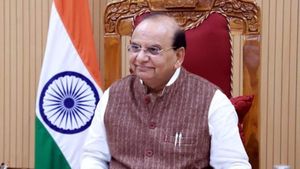Following outrage over vulgar remarks made by popular YouTuber Ranveer Allahbadia, commonly known as BeerBiceps, the controversial episode of the show 'India's Got Latent' has been removed from YouTube. The episode featured comedians Samay Raina and others, but it was Allahbadia's inappropriate comments during the show, particularly about sexual situations involving parents, which ignited public fury and sparked legal actions.
The incident took place during the filming of 'India's Got Latent', where Allahbadia questioned, "Would you rather watch your parents have sex for the rest of your life or join in once to make it stop?" Following the airing of this segment, the comments quickly went viral, leading to severe backlash on social media. Many netizens and public figures condemned the remarks, with some calling them obscene and perverse.
Kanchan Gupta, Senior Advisor at the Ministry of Information and Broadcasting, confirmed the government's intervention by reporting, "The 'India Has Latent' episode on @YouTube with obscene and perverse comments by Ranveer Allahbadia has been blocked following Government of India orders." The removal followed numerous complaints, including one resulting in an FIR filed against Allahbadia, Raina, and other cast members, citing promotion of obscenity.
The episode was initially restricted to members only but was later made unavailable entirely after the government's directive. Politicians and social commentary voices across the spectrum weighed in, emphasizing the need for accountability from content creators. Maharashtra Chief Minister Devendra Fadnavis criticized the incident, stating, "Everyone has freedom of speech, but this freedom ends when we encroach upon the freedom of others."
Allahbadia was not alone; fellow comedians and influencers on the show also faced criticism. Some prominent personalities, like journalist Neelesh Misra and Congress leader Supriya Shrinate, spoke out against the remarks, characterizing them as inappropriate and offensive. B Praak, a well-known singer, even canceled his appearance on Allahbadia's podcast, labeling the incident as "shoddy behavior" and highlighting the need for drastic measures.
Subsequently, the police have begun investigating the situation, with teams reaching out to Allahbadia and others for statements. Reportedly, there are two FIRs filed, one with the Assam police and another one being investigated by the Mumbai police. The Assam Chief Minister has indicated the seriousness of the allegations, stating they violate several laws prohibiting obscenity.
Allahbadia issued an apology on social media following the backlash, stating, "My comment wasn't just inappropriate, it wasn't even funny. Comedy isn't my forte; I am just here to say sorry." He emphasized his realization of the responsibility he held as a creator and acknowledged the wide-ranging impact of his remarks, especially considering the show's audience demographic.
The backlash has ignited broader conversations about the responsibility of content creators online and what constitutes appropriate humor. MPs from various parties have called for stricter guidelines on content shared across social media platforms, particularly highlighting the influence these creators wield over younger audiences. Shiv Sena MP Priyanka Chaturvedi has been vocal on the issue, asserting, "Any abusive language under the guise of comedy crosses limits and is not acceptable."
This debate is reflective of the growing concern about the impact of online media on societal norms and youth reactions. Critics argue this incident is not isolated; rather, it exemplifies the systemic issues within online content regulations. Various political figures, including MPs like Gaurav Gogoi, have urged Prime Minister Narendra Modi to pay closer attention to those he publicly supports, recommending stricter enforcement of rules governing online platforms.
The episode's removal also raises fundamental questions surrounding censorship, creative freedom, and the state's role in regulating social media content. While some assert the importance of artistic liberty, others insist on the necessity of imposing limits to protect societal values.
With the episode's removal, the future of 'India's Got Latent' and similar programming might be at stake as regulatory scrutiny intensifies. Broadcasters and platforms may now need to reassess their content guidelines to avoid similar controversies. The national conversation continues to evolve, with many urging accountability for creators, particularly those with large followings capable of influencing public perceptions significantly.
Whether this incident will lead to substantial changes within the media and entertainment industry remains to be seen but has certainly spotlighted the need for dialogue around sensitive subjects represented within popular forms of content.



